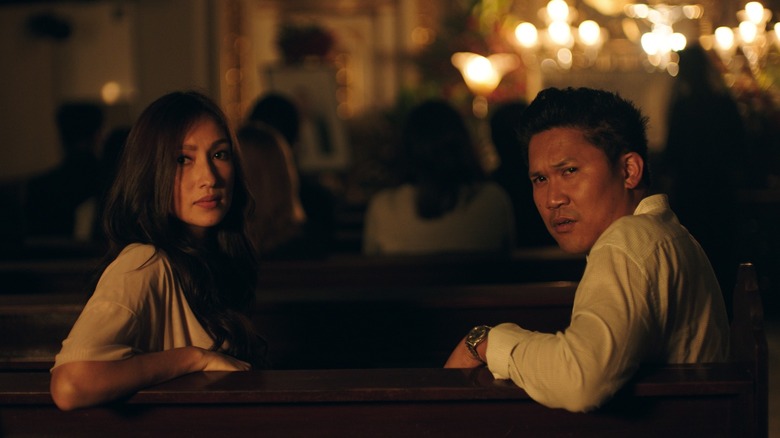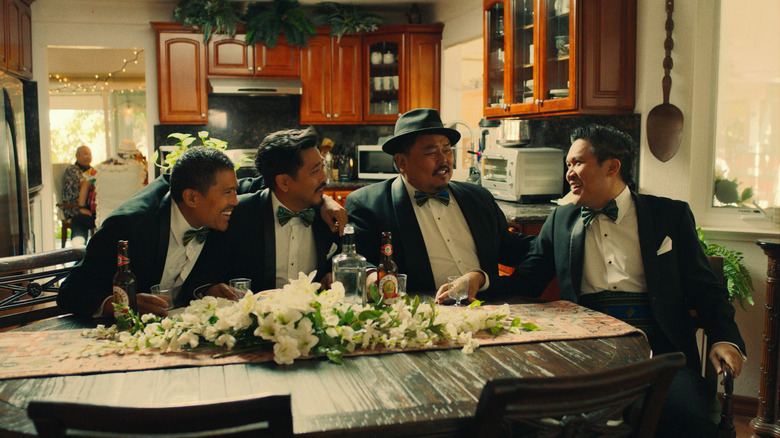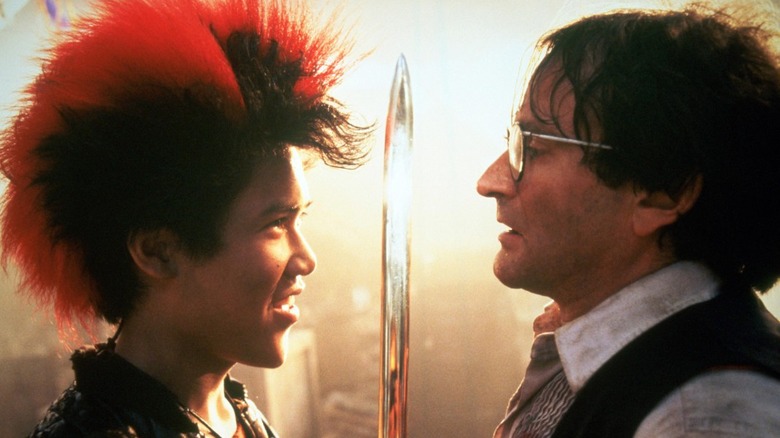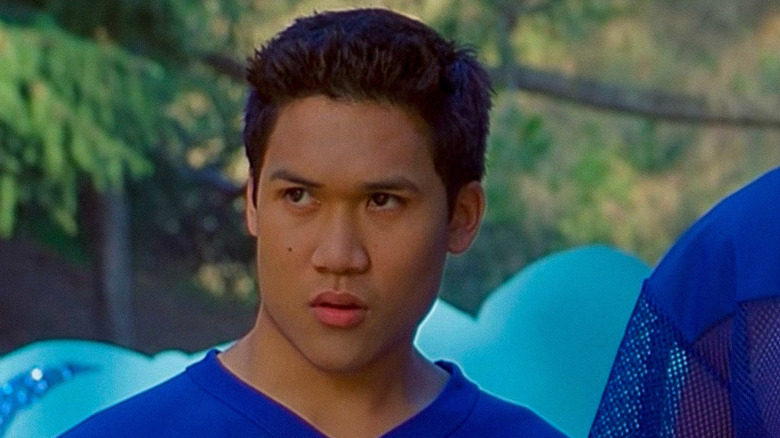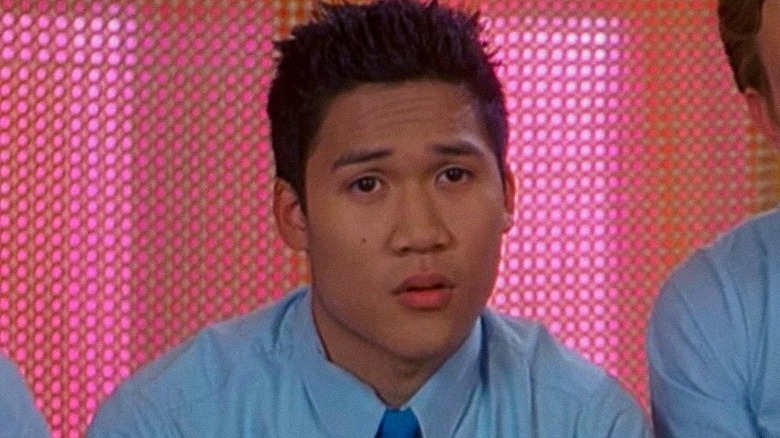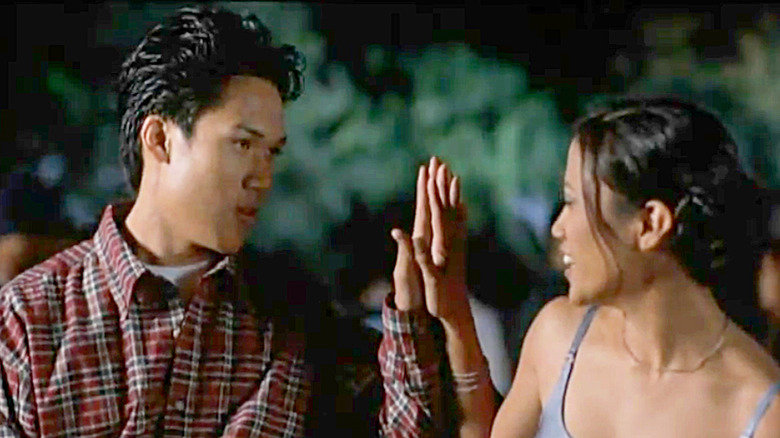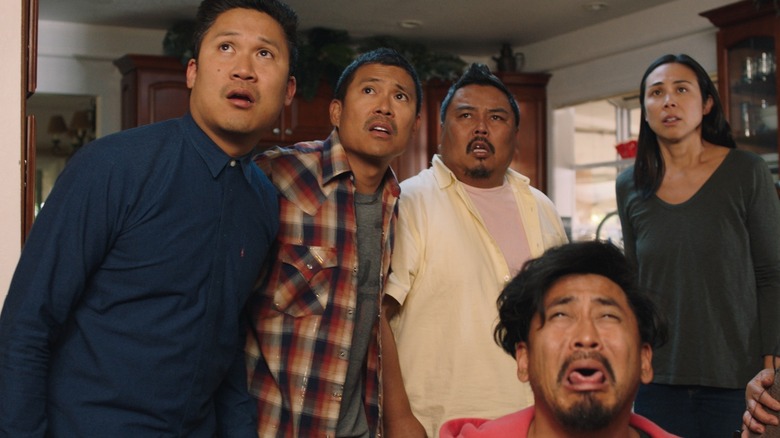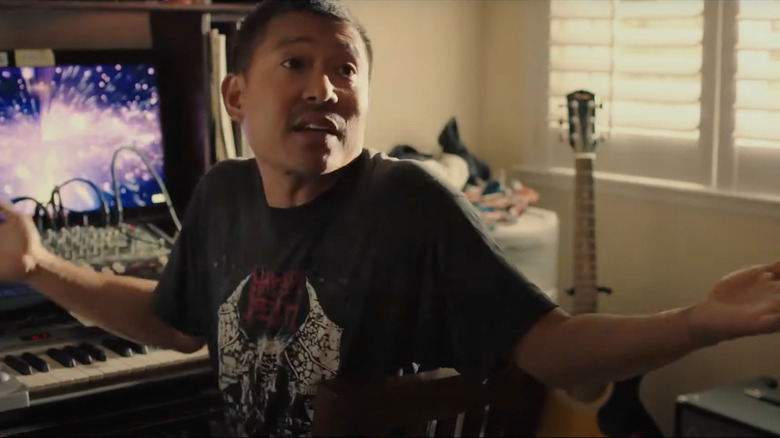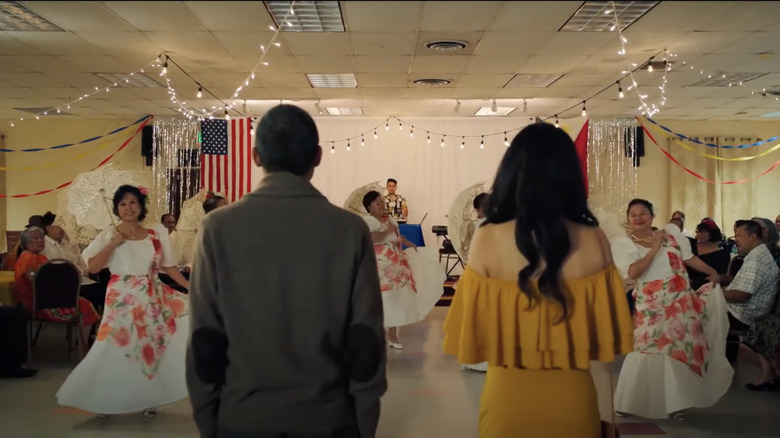The Fabulous Filipino Brothers' Dante Basco On His Directorial Debut And Filipino American Cinema [Interview]
On more than one occasion during my tenure at /Film, I've emphasized the importance of diversity in media. This is nothing new. As of February 2022, I've been advocating for this sort of thing professionally for ten years. But this cause has been near and dear to my heart since the moment I saw Dante Basco as Rufio in "Hook." For his part in the 1991 Peter Pan reimagining from Steven Spielberg, Basco played the leader of the Lost Boys. But for many movie-loving Filipinos and Filipino Americans of a certain age in the U.S., the Pittsburg, California native was the face of representation. He wasn't some background character in a hospital or a geeky brainiac: He was the badass that proved that people who looked like us could find a place in the Hollywood landscape.
Spanning three decades and counting, Basco's career has spawned a number of iconic roles. His face may scream "RU-FI-OOOOOO," but his voice would be familiar to fans of "Avatar: The Last Airbender" because he brought the fire-bending hothead Zuko to life as well. On top of that, he has various writing and producing credits to his name. But with his latest film, "The Fabulous Filipino Brothers," he now adds another accolade to his resume: the title of director.
For the first time since landmark Filipino American film "The Debut" in 2000, Dante Basco teams with his brothers, his sister, and nearly the whole Basco family onscreen to tell the story of four brothers confronting their issues with love, family, and culture ahead of a highly controversial Filipino wedding. I recently had the chance to talk to the beloved actor about his first foray into directing, representing Filipino culture, and the many ways things are changing (both in entertainment and in general) for the next generation of Asian Americans.
Step Into A World
This is a pretty ambitious project for you to take on as your directorial debut. Not only did you juggle multiple units in two countries, but you starred in the film. What was the hardest part of the process for you as a first time director?
Oh man. It's a labor of love, like most directorial debuts are, and it's an indie film. I had a great time. I had my brothers, so I could lean on my family. When I look back at it, I think acting and directing at the same time was pretty hard. Directing is hard anyway. But this is probably like my eighth film or so that I produced, so I kind of put my team together over the years of who I want to work with. I lean a lot on my producing partner, Rawn Erickson, to handle a lot of things as I was being creative. But to be of two different minds, to oversee a project and direct and really call the shots on everything from the acting to the production design and the camera work to the producing logistics of what's going on, then still trying to be present to kiss Solenn Heussaff. So it's hard. [Laughing]
Right? Real tough.
Real tough. Hard job, but someone's got to do it!
Do you think you will continue on the path of directing after that first experience?
I think so, with the right stuff. I have a few things I'm developing that I've written. There's also this era of Asian filmmaking going on right now, which is amazing. A bunch of different production groups have reached out to me to help some things they're doing, so there are some things on the horizon. There's some stories that I think I can add something to, so I'm sure there'll be some more in the future.
What They Do
You have worked with a wide variety of directors of the years as an actor, like Dave Filoni on a few "Star Wars" projects, Jamie Babbit on "But I'm A Cheerleader," and Steven Spielberg on "Hook." Did you take anything away from their styles or methods that you applied to your own process?
Oh yeah. As a kid, I was definitely impacted by Steven and just hanging out on the set on my days off to watch. Originally, it was to watch Robin Williams do improv and to watch Dustin Hoffman do character work. It's phenomenal. But then, every day I show up, I'm sitting right next to Steven Spielberg. And then he started to explain to me about directing and about how the camera moves and about lenses and lighting. That really impacted me as a kid. I didn't come to [do any of that]. I came to Hollywood as a break dancer. I didn't come to become a director, but as this whole journey has unfolded, I've been very fortunate in this town to get to do a lot of things.
And then with Jamie Babbit, I love Jamie. I was there for her directorial debut and being a part of that [I got to see a] super indie and how that is. I love everything she's still doing now and seeing her throughout the years. You learn to just get it done and to put out the fires that happen every day on set and still try to get the best out of your team, try to inspire your team.
Dave Filoni, brilliant. Come on, he's the keeper of the lore, dude. Filoni's the man. So with him, he just has effervescent, child-like joy in creating and storytelling. I try to bring all that stuff. I have no delusions of grandeur. I'm a kind of a journeyman lifer in this industry. I've been an actor and a filmmaker now for over 35 years. So it's most of my life. And if nothing else, I've acquired a lot of really good artists to surround myself with. I lean on them and hopefully I can create the soil every day to kind of have a good environment to inspire everybody else to do great work. And hopefully on the day, we're all on the same page and we can capture some of that great work on film.
The Next Movement
You explored the topic of homosexuality as Dolph in "But I'm a Cheerleader." Then here in "The Fabulous Filipino Brothers," you touch on adultery. These things are present in the Filipino community, but no one ever really talks about them. Especially like "straight up from the Philippines" Filipino people don't really talk about them, but they participate. How did it feel for you to bring that stuff to the forefront and show that really those things are okay to talk about?
Totally, man. I think we took a lot of risks in this film, but we're in a great time in filmmaking, and Asian filmmaking especially. I starred in "The Debut" 20 years ago and I love that movie, but there was a time where we're all trying to be the model minority. You have to be extraordinary. Even Ben Mercado [the main character of "The Debut"] had to be an extraordinary artist to rise to the top. That's the story of immigrants and people of color in America. We have to be these extraordinary people to be noticed or to be accepted as worthy, to be known within a society. At least [how] we feel it ourselves or it might have been. Who knows? That's just how it is.
But where we're at today, with the work we've all done collectively as a community, the last 20 years-plus, "Crazy Rich Asians" coming out and "Parasite" winning the Oscar, "Squid Game" becoming the biggest thing. It's our time to tell authentic stories. And authentic stories are not necessarily of the most extraordinary people. It's flawed. These are real, flawed people. Even in this film, these are four brothers. This is not "Crazy Rich Asians." This is definitely crazy blue collar Asians. They're not all doing things that are necessarily likable at the time. It's funny, it's a comedy, they're kind of like ambling through their life.
There's some things I didn't really understand as we were doing it. Just stories that came from our family that I wanted to tell that were interesting. Calamity that happens in life and in family. But at the end of the day, family is the thing that kind of holds us together. There's space for all that. Some of these things, we just touch on them. This is by no means some kind of blanket story for all Filipinos or whatnot, [like] I'm trying to teach everyone some big lesson. I got to tell these personal stories and let the audience kind of see it. Maybe laugh at it. Maybe think about it a little bit. I mean, adultery, it's in every culture, but it's very prevalent in our culture and it's there. There's a lot of ways to think about it, and of the audiences that I've shown it to, some people have talked about it and talked to me in private about it and how it's impacted and influenced their life and a lot of damage it's caused in life.
Come Clean
But also, they're like, "Are you glorifying it? Are you trying to romanticize it?" I'm like, "No, I'm not. I'm just telling a story." It's a bit of my family, too. It is easy to hate our whatever, our titos [tagalong for "uncles"] or whoever has done it. But then also you got to understand, they're just people going through a romantic moment also. [With] homosexuality, we touch a little bit [on that too]. My sister ends up with a female partner at the end of the story. These are things that are in our culture. Mental health. We touch upon, again, something in our culture that we don't necessarily really talk about a lot, but we're people like everybody and it's all within us. And it's a good time in our history or in pop culture for us to share these stories. It's all good. It's all good.
For the conversation to be out there and for us to talk about it is great. And some of the manongs came to some of the screenings, too, some of the elders. I was wary about how they would take it because they're from a generation that still wants us to be perfect in the eyes [of society]. It's the whole Asian face thing. We have to save face. We can't be out there showing our dirty laundry. But no, now's the time for us to do it. We're not making Hallmark movies out here. There's nothing wrong with those. Those are great. Those are fun, too. But to compete in the real Hollywood marketplace, people do not want to hear or see stories of just fantastical, perfect, pretty people walking around. We want to see ourselves and reflect upon that. Stories that are in our families. [That element of our movie has] been touching people and that's really been touching me.
Yeah, man. It definitely touched me while I was watching the movie and thinking about this: I don't think I've ever said this publicly, but I'm in therapy. I see a therapist pretty regularly. But my parents, my aunts and uncles, they're in the medical field and I never talk to them about it.
Right.
My cousins, because we're of the same generation, I guess they're cool with it. But sometimes I'm afraid to tell my mom like, "Hey, I'm seeing a therapist." Instead, I just say, "Hey, I have a doctor's appointment."
I have also been in therapy and it's helpful, man. If we need to like talk it out, it shouldn't be one of those things. We talk to our parents or grandmas and they're like, "Go to church, go to confession." You're like, "Huh?" It's changing, we're changing, we're evolving. We're American, man. It's part of what we're doing, but we're still Filipino. That's the thing. We're still Filipino. That's, I think, something that we all struggle with as Fil-Ams. The characters in the movie are struggling with it and trying to figure it out, and I drop little bread crumbs about that, too — about not just our culture to just explain it or to celebrate it for the world to see, but also things like my character [Duke] going home to the Philippines. Go home! There are things that touch you when you're home. There's answers to questions you don't even know you have because it's not your experience here. We're a nation of immigrants, man. Go home, reconnect. It's great to be American. We are American. We are part of the fabric of America. But the part of fabric of America is that we're a nation of immigrants. And if we go home, we connect to where we're from. It can strengthen everything.
Pass The Mic
We've talked a lot about the conversations happening around this film. Before Kevin Smith or the Grindhouse movies made it fashionable to bring films back on the road to create an experience for the audience, the whole team behind "The Debut" brought their films straight to the community. Did you look to recreate that experience by touring with "The Fabulous Filipino Brothers?"
One hundred percent, man. I love that. I didn't get to go to all the events back then, but it was so cool. Some people go, "What took you guys so long to come back?" And of course, I try to explain them how hard it is to make movies and how the world is changed and how things are happening. But at the same token, I get what they're saying. We need to keep that up. I want to keep it up. Even in time of COVID where it's kind of been made it extra challenging and we are taking all the precautions we can as we're doing these smaller screenings to keep people safe, it's about bringing it to the people.
It's amazing. We're coming out February 8. I want everybody to download the film [through VOD]. I want all your family and your friends to download the film because all those downloads are going to matter to not just me, but all the future filmmakers. Filipino filmmakers specifically. All the Asian filmmakers. If we can turn profit, we can show Hollywood how our voices count. But to be in a theater, to watch it and for us to see ourselves on screen, these have been profound moments for a lot of people watching the film and for me to witness it, too.
It's like I told Gene Cajayon, who directed and produced "The Debut." I said, "I know you want to be a filmmaker and I know you want to be a director. And I know with a lot of things, that's up to the industry. Hollywood breaks our hearts a million times. That's how it works. But sometimes we can't see what we actually built. You understand what you did with 'The Debut?' You built a network before social networks. You built an underground railroad." I'm trying to go back in and reconstruct what I know was there, because I experienced it. It's not unlike what Tyler Perry did when he constructed what Black Hollywood is today, when he did the quote unquote Chitlin' Circuit or the Bible Belt and did all the theaters with African American stars and then did the stories. And that turned into what he's doing with Madea and those movies. And now they have a full system working. It's their circuit. Part of me wants to do that.
This is the beginnings of putting "The Debut" track back together. This is not just for me. This is for us. For the next Filipino director to know that this is where all our audience is at. We can make movies, make money, and then sell it later on and it can be a model. We have to become a self-sustaining product. There's so many great filmmakers coming that I just want to be a part of letting them know. Go out with the film. The audience is there to support you. The experience is important. This is going to inspire the next generation of filmmakers.
When I'm out there saying, "It's our time," [I mean that ] it's our time as Asian Americans, it's our time as Filipinos to tell our stories and get our stories out there. But when I say it's our time, I'm always emphasizing it's not just our time as creatives, the filmmakers. We have to make the product, but it's our time as a community. You have to come and support. This is the relationship we have. We all have to do this together, and so that's where we're at. It's been incredible. Just inspiring to me, just going out to do it. A lot of work.
Yes!
Been a lot of work, but it's been fun.
And if "American Idol" has taught us anything over the years, it's that the Filipino community loves to support. So they all need to come out.
No doubt.
Mass Appeal
There are a lot of really funny moments in the movie that were just straight up shocking, but were so funny. How did you decide how far was too far? Obviously, showing someone getting hit by a car would bring the mood down, but Derek and the chicken? Were there takes that much further than that?
Yeah, there were some crazier takes. Dion stuff. There's some other crazy outtakes. Look, we're artists and we're telling stories and these guys can really go. Most actors that come to Hollywood, Filipino or not. I mean, Black, white, other. You don't actually ever get to do what you can actually do. You only audition for what you can audition for. And if you're lucky, if you're one of the few that book the job, you get to do the few lines or the small character they want you to do. But so many actors in Hollywood are brilliant and they never really get the chance. They're all Ferraris, but they're all driving in the slow lane because that's how they let them drive in.
So I let these guys go and some amazing things happened and I really wanted to push the envelope. When I was creating this project and it got funded and produced by Cignal Entertainment in the Philippines, I told them I want to do "The Fabulous Filipino Brothers." They're like, "What is that?" I was like, "It's a movie starring me and my brothers that I'm directing." So they were like, "That's already fascinating. We love the title. We love you guys. But what's the film?" And I'm like, "The film is 'My Big Fat Greek Wedding' meets 'Pulp Fiction.'"
They said, "What?" I said, "Yeah, 'Pulp Fiction,' but not like the violence of 'Pulp Fiction.' I don't even know if anyone's ever going to get this, but it's like the vignettes of 'Pulp Fiction' and the calamity and absurdity." [But] what's too much within a family setting? And of course in the writing there's the monologues and the pontification of some of the characters. I love stuff like that from Tarantino, so that's the kind of thing I wanted to do. I was lucky enough for them to kind of trust me and go, "Okay, I don't know what that is, but here it is."
Then [I get] to tell this personal story. All these things are based in family stories. I'll tell you where each story really comes from and what really happened and how it actually happened. That's why I know as far out as we went, it still is grounded in reality. We all know the reality, all collectively, all the brothers and my sister knew the reality of everything.
[But at the end of the day,] I'm a filmmaker. I'm not here making films just for the Filipino community. Yes, for the Filipino community, I want to represent, I want us to be out there with everybody, and I want the world to enjoy and celebrate our culture. But also I want other people to watch the movie and understand we're filmmaking. We're not doing some kind of just simple, easy story. We're taking risks like other filmmakers. We're putting stuff out there. We're trying to entertain. I'm trying to entertain and keep you on the edge of your seat sometimes, and maybe make you think, too.
Definitely. It's funny that you said Tarantino because when I was watching it, I definitely got some "Four Rooms" vibes.
Oh yeah! "Four Rooms," that's good. "Four Rooms" vibes, for sure.
If I Ruled The World
When you talk about actors being Ferraris, I can't help but bring up your second oldest brother, Darion, because his performance was just so raw and endearing. He's an untapped talent in the business right now.
He's amazing. I hope people get to see the film and see how good that he is. He's brilliant, man. He's done so many amazing performances throughout our lives in theater and things that we've seen in acting class because we've all studied together for 20 years. I've actually seen my brothers, every performance they've ever done in their lives. That's kind of one of those unique things I have as a first-time director that I may never have again and that no director's going to have. No one knows their cast like [this]: I know everything they've done and they know everything I've done. So, when this moment happens, "Remember when you did this at that time?" Whether it's on stage or whether it was in life, we can go directly to it and pinpoint it and go, "I need something like that. That's what I want." But just the craftsmanship of him as an actor. Yeah, he's untapped. He's just growing into himself now. We've all been in the industry the same amount of time, but I think his time's coming up. I hope people get to see what he can actually do. And I hope he gets to do all kinds of great characters in the future.
Tha Crossroads
For a lot of people, including myself, you were the first Filipino face that they saw on the big screen. As a champion of the community, do you ever feel any pressure as a pioneer for Filipino representation in Hollywood?
[Laughs] I mean, not really? I've been around for a long time [but] I'm super honored. Mayor Garcetti gave me and my family a plaque [for being] the first Asian American entertainment family in Los Angeles. Now we have generations [of the family in the business] with my niece, Ella Jay Basco [who appeared in "Birds of Prey: And the Fantabulous Emancipation of One Harley Quinn"]. So many young Filipino actors that I meet around town will credit my family and me in particular for being a source of inspiration to even have the courage to come here.
But yeah, there is pressure. That's why I make movies, that's why I'm producing and directing. I'm trying to create something for the next generation and create opportunities. My DP is Andrea Walter. She's Filipina and she got to be the director of photography of the film. I got [prominent Filipino American YouTube singer/songwriter] AJ Rafael. He scored this film. It's the first time he's ever scored a film and I know it's not going to be the last because he's so brilliant at it.
Things that we're doing in the future are about creating opportunities for others, and especially for Filipino voices and artists. Again, supporting this film is supporting the next generation. There's so many great directors coming that have so many great things. From [award-winning Macklemore music video director] Jon Jon Augustavo to [cinematographer] Francis dela Torre [and beyond], the success of something like this will open the doors for funding for future projects. Not just for myself, but for others. We're all a part of this whole pioneering time for Asians and media.
And it's not just me! "Yellow Rose" came out before. [Writer and director Diane Paragas] is a friend. She's amazing. And of course, Jo Koy's coming out with "Easter Sunday" later this year. He's a homie and we expect great things from that. We're a part of a movement. And we have to continue to be a part of it on both sides, creating and supporting.
It's so awesome how you're fostering that next generation through all of that. And personally, thank you, because I don't think I would've gotten into this line of work if it wasn't for things like that and you.
Hey man! Well, thank you. Thank you for having the courage to keep going and doing it because we need all of our voices in every aspect of media. We matter. Our perspective matters.
Yes! And we need to hear that more often, too.
Ready Or Not
Finally, I know that my time's almost up. But really quickly: At Duke's speaking engagement in the Philippines, I saw a graphic for "Red Roses: The Musical," which is the musical based on AJ Rafael's 2011 album. It's something that's been floating around for a while now.
Yeah!
How is that coming?
Oh, there's scripts. We wrote scripts, a few different scripts. It's still something I'm very passionate about doing. AJ and I, we're talking about it. It's something I want to get done. So we'll see if we get it done. [That Easter egg] was my idea. It's a good thing you caught that! It's one of those wish board things I'm putting out there to hopefully get together this year. So we'll see what happens.
"The Fabulous Filipino Brothers" is now available on iTunes or you could catch it on tour in a town near you.
